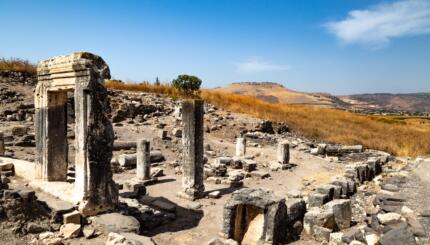That’s not something you hear all the time, especially on the day leading into Yom Kippur, perhaps the most G*d soaked day of them all. Now there are rabbinic colleagues of mine who are humanists and live and teach Jewish values in a framework that does not necessarily affirm the existence of G*d. But the Rabbis In favor of Atheism I am referring to are not these rabbis and are not contemporary Rabbis at all. Nor are they atheists by any stretch.
A story: The master R. Leib of Sassov taught that no attribute that was created was created in vain. His student could not resist challenging him: “so what use can denial of G*d’s existence have.” The master looked at him and answered: when some one comes to you and says they are in need you should not say “G*d will provide” but act as if in fact there is no one to act but you.
This very conversation was also attested to in the yeshivot, the study houses, of the Lithuanian Sages influenced by Mussar, a movement dedicated to spiritual refinement and relentless self-searching in lieu of purely outward signs of piety. The great architect of the Mussar school was Rabbi Yisroel Salanter whose personal acts of community service combined with pointed aphorisms to inspire a lasting heritage of life lessons.
One of his sayings that has become beloved by many is “the material needs of my neighbor are my spiritual needs…. With oneself one should privilege the soul above the body, but with others do not disregard the body…. do not rely on trust of G*d.”
Like Rabbi Moshe Leib of Sassov, Rabbi Yisroel knew how easily one could lose sight of a key purpose of faith – not to concern oneself with other’s soul, but with their physical needs.
In fact, their insights arise from a deeper place in the tradition. The stirring chapters of Isaiah that are read on the morning of Yom Kippur. At the very time when the people are fasting, intentionally refraining from the physical presumably to elevate the place of the spiritual, we read the great prophet’s words on behalf of G*d: ” Is such the fast I desire, a day to starve their bodies?…… No, this is the fast I desire: To unlock the fetters of wickedness…. to share your bread with the hungry, and to take the wretched poor into your home; when you see the naked, to clothe them, and not to ignore your own flesh”
On this day, so coursing with spiritual imagery, as we release ourselves from the bounds of the physical world, we must be reminded, whatever our conception of G*d or G*d’s absence, the responsibility to act on the material needs of others is not in heaven but for us.
For those fasting, fast well and may we all be inscribed for a year of fulfilled needs and fulfilling actions.



